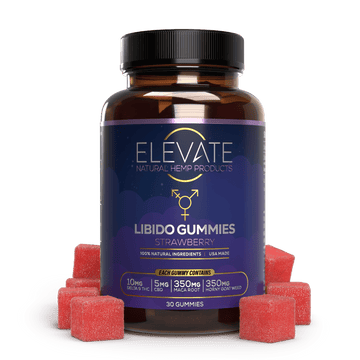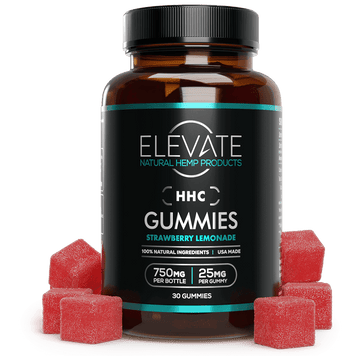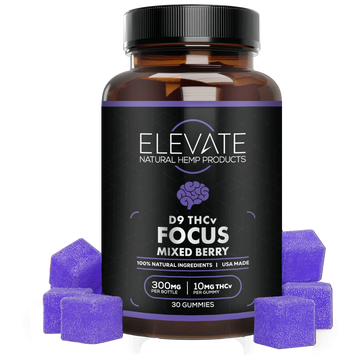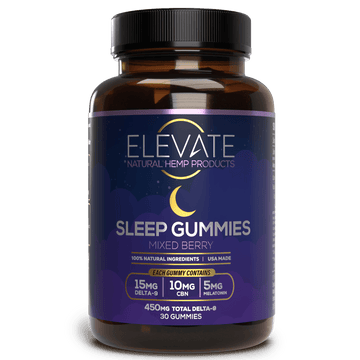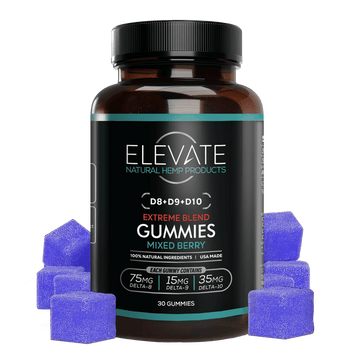THCP vs. Delta 8 THC: Potency & Effects Explained

THCP vs Delta 8:
- THCP: Up to 33x more potent than Delta 9, very strong effects, long duration
- Delta 8: 50-70% as potent as Delta 9, mild relaxation, shorter duration
- THCP requires microdosing (1-3mg), Delta 8 uses standard doses (10-25mg)
- THCP better for experienced users only
Table of Contents
It’s fascinating how a tiny difference in a molecule’s structure can create a completely different experience. This is exactly the case when comparing THCP and Delta 8 THC. Both are cannabinoids derived from the cannabis plant, but they offer wildly different effects. You might know Delta 8 for its mellow, clear-headed feeling. THCP, on the other hand, is a relative newcomer known for its profound potency. Understanding this distinction is key to finding the right product and getting the experience you actually want. We'll explore what sets them apart, from their chemical makeup to their unique effects.
Understanding the differences between THCP and Delta 8 THC is important for anyone interested in the effects and potential uses of these cannabinoids. As their popularity grows, knowing what sets them apart can help users make informed decisions.
So, What Exactly Is THCP?
THCP, short for tetrahydrocannabiphorol, was discovered recently, yet it has already gained significant attention due to its remarkable potency, believed to be substantially higher than Delta 9 THC. The distinctiveness of THCP lies in its chemical structure, specifically a longer alkyl side chain, which allows it to bind more effectively to CB1 receptors in the brain. This stronger binding affinity results in much more intense psychoactive effects, even at lower doses.
The Discovery of THCP
Scientists only identified THCP in 2019, making it a relatively new player in the world of cannabinoids. What makes it so interesting is its incredible potency. Research shows that THCP binds to the brain's cannabinoid receptors (CB1) about 33 times more effectively than traditional Delta 9 THC. This powerful connection is all thanks to its unique chemical structure—specifically, a longer alkyl side chain that allows it to form a much stronger bond with our body's endocannabinoid system. This enhanced binding affinity means that even a small amount of THCP can produce significant effects, setting it apart from other, more common cannabinoids.
Why THCP Might Explain Potency in Certain Strains
This discovery might solve a long-standing mystery in the cannabis community: why do some strains feel much more powerful than their THC percentage suggests? The presence of THCP, even in trace amounts, could be the answer. Its intense potency can lead to profound feelings of relaxation and euphoria, and some users report it provides strong pain relief and helps reduce swelling. Because of these powerful effects, THCP is thought to be the hidden ingredient that gives certain strains their legendary kick, offering a more intense and long-lasting experience than THC alone.
Is THCP Legal Where You Live?
As with many cannabinoids, the legal status of THCP is complex and varies significantly depending on the region. In the United States, THCP’s legality is closely tied to its association with THC. Since THCP is a naturally occurring cannabinoid found in cannabis, it is subject to the same legal scrutiny as THC. However, because it is so new, many jurisdictions have not yet specifically addressed its legal status. In Canada and Europe, similar legal ambiguities exist, with regulations often focusing on THC content without explicitly mentioning THCP.
How Strong Is THCP, Really?
THCP’s interaction with the endocannabinoid system is particularly potent. Users have reported effects similar to Delta 9 THC but with increased intensity. This heightened potency might appeal to those seeking a stronger experience, though it also necessitates careful dosing to avoid overwhelming effects.
User-Reported Effects: More Than Just a High
People who use THCP often report an experience that is both intense and long-lasting. The primary feeling is one of deep relaxation that can be very calming and euphoric. Many describe it as a powerful, heady high that can also lead to significant drowsiness, making it a popular choice for those looking to unwind completely or get help with sleep. Because of its strong binding affinity, the effects are much more pronounced than those of Delta 9 THC, even with a smaller amount. This means feelings of happiness and altered senses are amplified, which is why starting with a very low dose is always recommended to see how it affects you personally.
And What About Delta 8 THC?

Delta 8 THC has gained considerable popularity in recent years, largely due to its milder psychoactive effects compared to Delta 9 THC. It is often described as providing a smoother, less anxiety-inducing high, making it an attractive option for those who want the benefits of THC without the intensity that sometimes accompanies Delta 9.
What Does Delta 8 Feel Like?
The primary difference between Delta 8 THC and Delta 9 THC lies in their chemical structure, specifically the location of a double bond on the carbon chain. This slight variation results in Delta 8 having a lower affinity for CB1 receptors, which translates to its milder effects. While Delta 8 shares many of the therapeutic benefits of Delta 9 THC, such as pain relief, appetite stimulation, and nausea reduction, it is often preferred by users who find Delta 9 too strong or anxiety-inducing.
Understanding Delta 8's Legal Status
The legal status of Delta 8 THC is currently a subject of much debate. In the United States, its legality remains somewhat ambiguous. The 2018 Farm Bill legalized hemp-derived cannabinoids, and Delta 8 THC, being derived from hemp, initially fit within this framework. However, several states have moved to restrict or ban its sale, citing concerns over its production process and the lack of regulation.
THCP vs. Delta 8: A Head-to-Head Comparison
Why Their Chemical Makeup Matters
THCP and Delta 8 THC are both cannabinoids, but their molecular structures set them apart significantly. The most notable difference lies in the alkyl side chain of their molecules. THCP has a longer side chain, which allows it to bind more effectively to CB1 receptors in the brain. This difference is crucial because it’s this binding that determines the potency and psychoactive effects of these compounds. While Delta 8 THC has a similar structure to the more commonly known Delta 9 THC, it has a double bond on the eighth carbon chain, which results in a milder effect. THCP’s unique structure makes it far more potent than both Delta 8 and Delta 9 THC.
Understanding Δ8-THCP
So, what makes THCP so powerful? It all comes down to its chemical structure. THCP, or tetrahydrocannabiphorol, has a longer carbon chain than traditional THC—seven carbons compared to five. This seemingly small difference allows it to bind much more effectively with the CB1 receptors in your brain. Think of it like a key fitting perfectly into a lock. This superior binding ability is why THCP produces such intense psychoactive effects, even when consumed in very small quantities. It’s a cannabinoid that commands respect due to its sheer strength, offering a profoundly different experience from other, more common forms of THC.
How Are THCP and Delta 8 Made?
Both THCP and Delta 8 THC originate from the cannabis plant, but the journey to your favorite products isn't always a straight line. THCP is a naturally occurring cannabinoid, but it’s found in such minuscule amounts that extracting it directly isn't practical. Instead, most of the THCP on the market is created in a lab by converting CBD, a more abundant compound found in hemp. Similarly, Delta 8 THC is also present in small quantities in the hemp plant. To create enough for products like Delta 8 gummies, scientists often convert CBD into Delta 8 through a specific chemical process, ensuring a consistent and reliable supply.
Comparing Potency: Which One Is Stronger?
When it comes to potency, THCP is believed to be significantly stronger than Delta 8 THC. Users often report that even small doses of THCP can produce an intense psychoactive experience, much stronger than those from Delta 8. Delta 8 THC, on the other hand, is known for its milder and more controlled effects, often described as a smoother high compared to Delta 9 THC. Delta 8 is a less potent psychoactive compound and is less likely to induce anxiety or paranoia, making it a preferred choice for those who are sensitive to the stronger effects of Delta 9 or THCP.
THCP’s effects are still being studied, but early reports suggest it might provide more intense versions of the effects associated with THC, such as heightened euphoria and stronger body sensations. However, these powerful effects also mean that THCP should be used with caution, especially by those who are new to cannabinoids derived from hemp or cannabis plants.
Potency by the Numbers
When we look at the science, the difference in strength is staggering. Research shows that THCP binds to the brain's cannabinoid receptors (CB1) about 33 times more effectively than traditional Delta 9 THC. This incredible binding affinity is why THCP can deliver such a powerful and intense high, far surpassing what you'd experience with Delta 8. On the other hand, Delta 8 THC is known for its much gentler effects. It provides a smoother, more manageable high, which is why many people prefer products like Delta 8 gummies for a more relaxed and clear-headed experience without the overwhelming intensity that can come with more potent cannabinoids.
How to Take THCP and Delta 8
THCP and Delta 8 THC offer various consumption options, much like other cannabinoids. Both are available in a range of products, including vapes, edibles, tinctures, and capsules, catering to different preferences and needs. Vaping and edibles are particularly popular because they provide a quick onset of effects and are easy to use. However, due to its high potency, THCP is often consumed in smaller doses, with users needing to be cautious about the amount they intake. This careful dosing is essential, as even a small amount of THCP can produce very intense effects.
User experiences with THCP can vary widely, but many report its effects as being significantly stronger than other cannabinoids, even at low doses. This potency makes it a choice best suited for experienced cannabis users who are familiar with strong psychoactive effects. For those who are new to cannabinoids or prefer a less intense experience, THCP might be overwhelming, and starting with a very small amount is crucial.
Delta 8 THC, on the other hand, is known for its milder effects and is often consumed by those looking for a more relaxed, clear-headed high. Its effects are less likely to induce anxiety or paranoia, making it a more versatile option. Delta 8 THC is appreciated for providing the benefits of THC without the intense high that can sometimes come with Delta 9 or THCP. This makes it an excellent choice for both new users and those looking for a daily-use cannabinoid that won’t disrupt their routine.
Testimonials from THCP users frequently highlight its powerful effects, with many recommending it primarily for those with prior cannabis experience. Users often describe a deep sense of euphoria and heightened sensory perception, but with the caveat that it’s not for the faint-hearted. Delta 8 THC, conversely, is praised for its manageable and balanced high, making it accessible to a broader audience, from first-timers to seasoned users.
Finding the Right Products for You

When it comes to availability, Delta 8 THC and CBD are more widely accessible in the CBD market, especially in regions where Delta 9 THC faces legal restrictions. You can find Delta 8 THC in products ranging from gummies and tinctures to vape cartridges. It’s often marketed as a legal alternative to Delta 9 THC, making it popular in areas with stricter cannabis laws.
THCP, being a newer and less understood cannabinoid, is less common but is gradually gaining traction in the cannabis market. Due to its high potency, THCP products are often marketed in lower doses or blended with other cannabinoids to balance the effects. This allows users to experience THCP without being overwhelmed, but it also means that finding pure THCP products might be more challenging.
How Do They Compare to Other Cannabinoids?
The world of cannabinoids is constantly expanding, and while THCP and Delta 8 are getting a lot of attention, they're just part of a much larger family. Understanding how they stack up against other popular compounds can give you a better sense of the wide spectrum of experiences available. Each cannabinoid has a unique profile, offering different levels of intensity and types of effects. From the energizing buzz of Delta-10 to the potent, long-lasting journey of HHC, there's a lot to explore. Knowing the key differences helps you make more informed choices about what might work best for your needs and tolerance level, ensuring you find the right fit for your desired outcome.
Let's look at a few other notable cannabinoids and see where they fit in. This quick comparison will help you place THCP and Delta 8 within the broader context of hemp-derived products. Whether you're seeking something mild and functional or a more profound, relaxing experience, there's likely a cannabinoid out there for you. Remember that effects can vary from person to person, but these general guidelines provide a solid starting point for your research. Always consider the potency and duration when trying something new to ensure a positive and comfortable experience.
Delta-10 THC
Think of Delta-10 THC as the energetic sibling in the THC family. It’s generally considered less potent than Delta-9, offering a more uplifting and cerebral experience. Many users compare its effects to Sativa cannabis strains, describing a clear-headed, motivating buzz that’s great for daytime activities, creative projects, or social gatherings. Unlike the heavy body sensation some cannabinoids can produce, Delta-10 tends to provide a "mind high" that keeps you engaged and focused. If you find Delta-8 a bit too relaxing or want to avoid the intensity of stronger compounds, Delta-10 could be an excellent choice for a functional, mood-lifting effect.
HHC (Hexahydrocannabinol)
HHC is another interesting compound that offers a unique experience. It's known for being less potent than Delta-9 THC, delivering a high that is often described as gradual, euphoric, and deeply calming. One of its standout features is its potential longevity; some users report that the effects of HHC products can last for an extended period, sometimes up to 12 hours. This makes it a great option for those seeking sustained relaxation or relief without constant redosing. The high is typically smooth and manageable, making it a popular choice for unwinding after a long day or settling in for a relaxing weekend.
THCOa (THC-O)
THC-O is a cannabinoid that demands respect due to its powerful nature. It is a fully synthetic compound and is estimated to be about three times stronger than traditional Delta-9 THC. Because of how it's metabolized, THC-O has a delayed onset, meaning it can take longer to feel the effects, which can sometimes catch inexperienced users off guard. Once it kicks in, it’s known for producing intense euphoria and profound relaxation that some describe as almost spiritual. Given its strength and delayed reaction time, it’s crucial to start with a very small dose and be patient before considering taking more.
HHCP (Hexahydrocannabiphorol)
If you thought THCP was potent, meet its cousin, HHCP. This cannabinoid is considered extremely powerful, with some sources suggesting it could be up to ten times stronger than Delta-9 THC. Its effects are often compared to THCP but with even greater longevity, providing a strong, euphoric high and deep, long-lasting relaxation. HHCP is definitely not for beginners and is best suited for highly experienced cannabis users with a significant tolerance. Its intense and enduring effects make it a compound to approach with extreme caution and a thorough understanding of your own limits.
Safety and Responsible Use
With any cannabinoid, but especially with highly potent ones like THCP and HHCP, responsible use is key to a positive experience. The golden rule is to "start low and go slow." This means beginning with a very small dose—perhaps a fraction of a gummy or a single, small puff—and waiting to see how it affects you. With edibles, this can take up to two hours, so patience is essential. Taking too much too soon can lead to an overwhelming and uncomfortable experience, so give your body ample time to respond before you even think about taking more. This approach allows you to find your personal sweet spot without overdoing it.
It's also incredibly important to purchase your products from a reputable source that provides transparent, third-party lab results. This ensures you're getting a product that is pure, accurately dosed, and free from harmful contaminants. Beyond that, consider your setting. When trying a new cannabinoid for the first time, make sure you're in a safe, comfortable environment where you can relax without any pressure. Understanding your own goals is also part of responsible use. If you're looking for something to help you unwind, you might explore products specifically designed to promote a sense of calm, like our Delta 8 Gummies, which are known for their milder effects.
Potential Side Effects to Know
Both THCP and Delta 8 THC come with potential side effects, though they differ due to their varying potencies. THCP’s side effects are similar to those of Delta 9 THC but are often more intense. These can include dry mouth, red eyes, increased heart rate, and, in some cases, anxiety or paranoia, especially at higher doses. Delta 8 THC’s side effects are typically milder and may include slight drowsiness, dry mouth, and mild euphoria.
For first-time users, it’s crucial to start with low doses, especially with THCP, due to its high potency. Beginners might find Delta 8 THC more approachable, as its effects are easier to manage. Dosing carefully and waiting to assess the effects before consuming more can help avoid negative experiences.
Understanding the Risk of Dependency
It's always wise to be mindful of dependency when trying new substances. Because THCP is so potent, taking too much can lead to more intense negative effects like anxiety, paranoia, and a rapid heart rate. There isn't much long-term research on THCP's specific risks, but since we know that THC can be habit-forming for some individuals, it's reasonable to assume that THCP might carry similar risks. The key is responsible use: understanding your own limits, starting with a very low dose, and being aware of how frequently you're using these products. Listening to your body and maintaining a balanced approach is the best way to enjoy the benefits without creating unhealthy habits.
Will THCP or Delta 8 Show Up on a Drug Test?
This is a common and important question, and the short answer is yes, both THCP and Delta 8 THC will likely cause you to fail a drug test. Most standard drug screenings aren't designed to distinguish between different types of THC; they simply detect the presence of THC metabolites. Since THCP and Delta 8 are both analogs of THC, your body processes them in a similar way, creating the metabolites that these tests are looking for. If you are subject to drug testing for your job or any other reason, it's best to avoid these cannabinoids completely to prevent a positive result.
Always Check for a Certificate of Analysis (COA)
In the world of cannabis products, transparency is everything. A Certificate of Analysis, or COA, is a document from an independent, third-party lab that verifies what's in a product. This is your proof that what's on the label is actually in the bottle. Reputable brands will always make these reports easily accessible for their products. When you look at a COA, you can confirm the potency of cannabinoids like THCP and Delta 8 and, just as importantly, check that the product is free from harmful contaminants like pesticides, heavy metals, and residual solvents. Always review the COA before making a purchase to ensure you're getting a safe and high-quality product.
THCP or Delta 8: How to Choose
Choosing between THCP and Delta 8 THC depends on personal tolerance and desired effects. THCP might be more suitable for experienced users seeking a potent effect, while Delta 8 THC could be better for those looking for a milder, more controlled experience.
Cannabis experts often suggest that users start with Delta 8 THC to gauge their tolerance before exploring stronger cannabinoids like THCP. The intensity of THCP means it’s generally recommended for those with prior experience with THC products.
FAQs
A THCP high is often described as much more intense than a typical THC high. Users report a strong sense of euphoria, heightened sensory perception, and deep relaxation. Because THCP binds more effectively to CB1 receptors in the brain, the psychoactive effects are significantly more powerful, even at lower doses. This can lead to a more profound mental and physical experience, making it best suited for those with prior experience with THC. Due to its potency, starting with a very low dose is recommended to avoid overwhelming effects.
Q2. How Long Does a THCP High Last?
A THCP high generally lasts longer than a traditional THC high. While the exact duration can vary depending on factors such as dosage, individual tolerance, and method of consumption, users typically experience effects lasting between 6 to 12 hours. The peak of the high might occur within the first 2 to 3 hours, followed by a gradual decline. However, due to its potency, even the comedown phase can feel more prolonged compared to Delta 9 THC or Delta 8 THC, making it important to plan accordingly.
Q3. Which Is Stronger, HHC or THCP?
THCP is significantly stronger than HHC. While HHC, or hexahydrocannabinol, offers a mild-to-moderate psychoactive effect similar to Delta 8 THC, THCP is far more potent. THCP’s binding affinity to CB1 receptors is much higher than HHC, resulting in a more intense and longer-lasting high. HHC might be preferred by those looking for a gentler experience, while THCP is better suited for users who want a powerful and immersive effect. The choice between the two depends largely on the desired strength and type of experience.
No, THCP is not artificial; it is a naturally occurring cannabinoid found in very small amounts in certain strains of cannabis. It was discovered relatively recently and has drawn attention due to its high potency compared to other cannabinoids. However, because it is present in such low concentrations naturally, most THCP found in products is synthesized from other cannabinoids like CBD or Delta 8 THC to produce a sufficient quantity for commercial use. This process involves chemical conversion but does not make THCP an artificial substance.
No, THCP is not the same as CBD. THCP and CBD are both cannabinoids found in the cannabis plant, but they have vastly different effects. THCP is psychoactive and binds strongly to CB1 receptors in the brain, leading to a potent high similar to or stronger than Delta 9 THC. On the other hand, CBD is non-psychoactive and does not produce a high. Instead, CBD is known for its potential therapeutic benefits, such as reducing anxiety, inflammation, and pain without the intoxicating effects associated with THC or THCP.
Making Your Final Decision
Recapping the main differences, THCP is a potent cannabinoid suited for experienced users, while Delta 8 THC is more accessible and offers a gentler high. Depending on your needs, either cannabinoid could be a good fit, but always consider your personal tolerance and the legal landscape in your area. For those looking to elevate their experience with high-quality HHCP products, Elevate offers a range of options designed to meet your needs.
Key Takeaways
- Choose your intensity: THCP offers a powerful and long-lasting experience, making it significantly stronger than Delta 8, which provides a gentler, more clear-headed high.
- Start with Delta 8 if you're unsure: Its milder effects make it a great starting point for beginners or anyone sensitive to THC. Reserve the potent experience of THCP for when you have a higher tolerance and know what to expect.
- Always verify your product and dose: Your safety comes first. Begin with a very small dose to see how you react, and only buy from brands that offer a third-party Certificate of Analysis (COA) to confirm purity and potency.
Related Articles
Join Our Newsletter
Sign up to be the first to know about our can't-miss product drops, special VIP offers & exclusive discounts.

